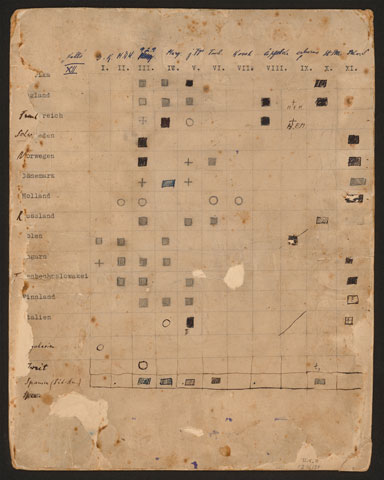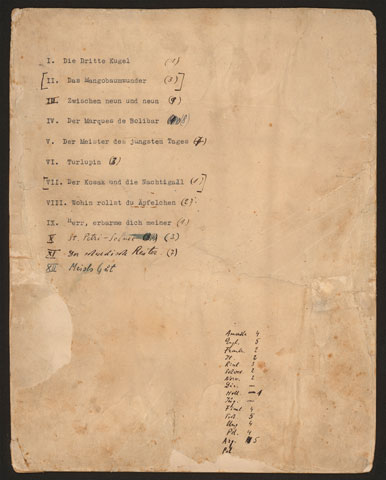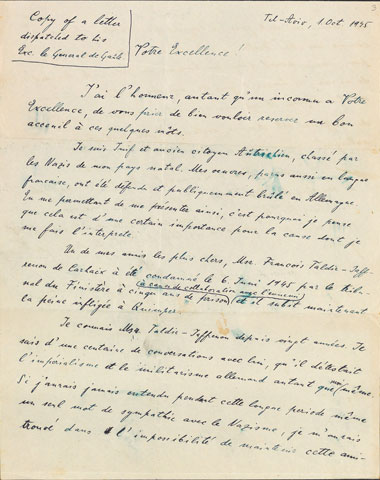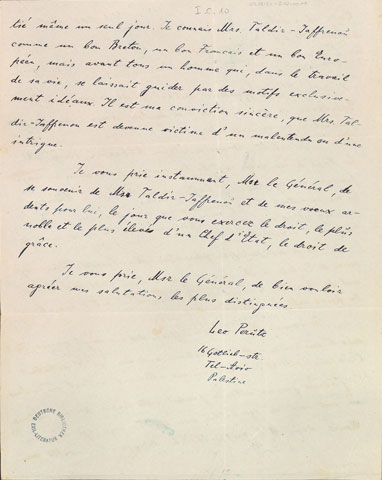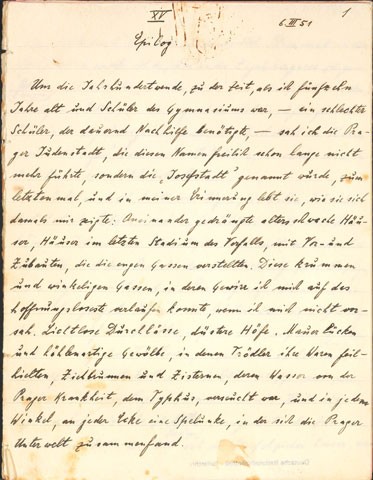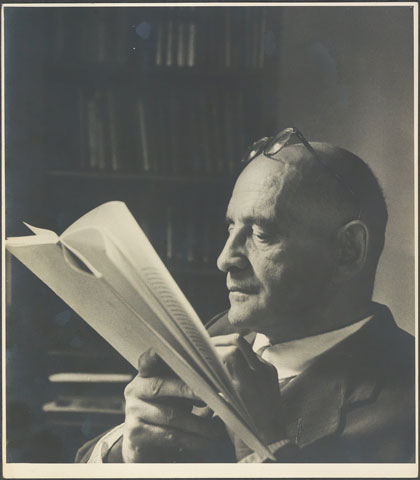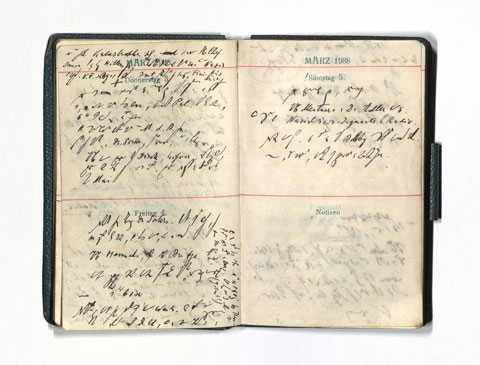Leo Perutz’ literary estate now accessible worldwide in digital format

German Exile Archive 1933-1945 now providing access to the writer’s manuscripts and previously unpublished family correspondence
2 November 2021 press release
The German Exile Archive 1933–1945 will be marking the birthday of Austrian writer Leo Perutz on 2 November by making large parts of his digitised estate available online.
Leo Perutz (1882-1957) was one of the most successful, widely read Austrian authors of his day until the annexation of Austria forced him to leave the country in July 1938 and emigrate to Palestine via Italy. In Palestine, he earned his living as an actuary, a profession in which he had previously worked and carried out research. Perutz did not enjoy much success as a writer after his flight into exile.
He wrote his almost continuous diary entries (1909-1957) in the Gabelsberger shorthand popular around 1900. The entries provide insights into Perutz’ literary output and the political events of that time. He anticipated the annexation of Austria in his diary on 3 March 1938, 10 days before the event, with the words “Finis Austriae”.
Since the end of the 1980s, publishers have been rediscovering and reprinting Perutz’ extensive oeuvre, which includes novellas, stories, plays, travelogues, dramas and novels. Along with historical novels such as Die dritte Kugel (“The Third Bullet”, 1915), Der Marques de Bolibar (“The Marquis of Bolibar”, 1920) and Turlupin (1924), Perutz also wrote works of light literature such as Zwischen neun und neun (“From Nine to Nine”, 1918), Der Meister des Jüngsten Tages (“The Master of the Day of Judgement”, 1923), and the bestseller Wohin rollst Du, Äpfelchen (“Little Apple”, 1928), of which Ian Flemming, the famous author of the James Bond novels, wrote: “The word ‘genius’ has long relinquished its meaning as a result of misuse, otherwise I would simply have described the book as ‘a work of genius’”.
His two last novels, which he worked on while living in Israel, were not published until shortly before his death Nachts unter der steinernen Brücke (“By Night under the Stone Bridge”, 1957)) or posthumously Der Judas des Leonardo (“Leonardo’s Judas”, 1959).
His estate, which has been held at the German National Library’s Exile Archive since 1986, encompasses the manuscripts of almost all his novels as well as a number of works that are still unpublished and incomplete. It also includes a large amount of correspondence, including family letters which have never yet been published. With the digitised material and archival materials – including the diaries – now accessible worldwide, Leo Perutz's estate offers numerous starting points for scholars to engage with his work and biography and to develop new perspectives.
Digitised estate of Leo Perutz
Digitised works available online in the catalogue of the German National Library
Background
The task of the German National Library’s German Exile Archive 1933–1945 is to collect publications and documents relating to German-language exile during the Nazi era. The publications include all books and brochures in the fields of literature, politics, science and Jewish emigration written by German-speaking emigrants abroad between 1933 and 1950 along with the magazines they published. The documents include personal legacies from German-speaking emigrants in all fields and professions, archives of exile organisations and individual autographs.
Since March 2018, selected exhibits from the German Exile Archive's own collection have been on display in the permanent exhibition “Exile. Experience and Testimony” in Frankfurt am Main. In addition, the German Exile Archive manages the network project “Arts in Exile”. The German Exile Archive’s events and temporary exhibitions take a closer look at other themes and thus draw parallels between historic exile and current phenomena.
Contact
Contact person
Dr. Sylvia Asmus, Head of the German Exile Archive 1933–1945
Phone: +49 69 1525-1900
s.asmus@dnb.de
Press image material
Images for editorial use; Press image material is only available in German. All images: German National Library's German Exile Archive 1933-1945, estate of Leo Perutz, EB 86/094, private property. For the image „Epilog aus Leo Perutz: Nachts unter der steinernen Brücke (Meisls Gut), Manuskript (1951)“ With kind permission of Paul Zsolnay Verlag Wien, © Paul Zsolnay Verlag Wien 1975 und 2000
Tabelle des Schriftstellers Leo Perutz über Veröffentlichungen seiner Werke im Ausland, nach 1945
Tabelle des Schriftstellers Leo Perutz über Veröffentlichungen seiner Werke im Ausland, nach 1945
Leo Perutz: Brief an Charles de Gaulle, Tel Aviv, 1. Oktober 1945
Leo Perutz: Brief an Charles de Gaulle, Tel Aviv, 1. Oktober 1945
Epilog aus Leo Perutz: Nachts unter der steinernen Brücke (Meisls Gut), Manuskript (1951)
Der Schriftsteller Leo Perutz, vermutlich in den 1950er Jahren, Fotograf unbekannt, undatiert
Doppelseite aus dem Tagebuch von Leo Perutz. Einträge vom 3. bis 5. März in Gabelsberger Kurzschrift.
Last changes:
02.11.2021
Short-URL:
https://www.dnb.de/perutz
Contact:
presse@dnb.de


